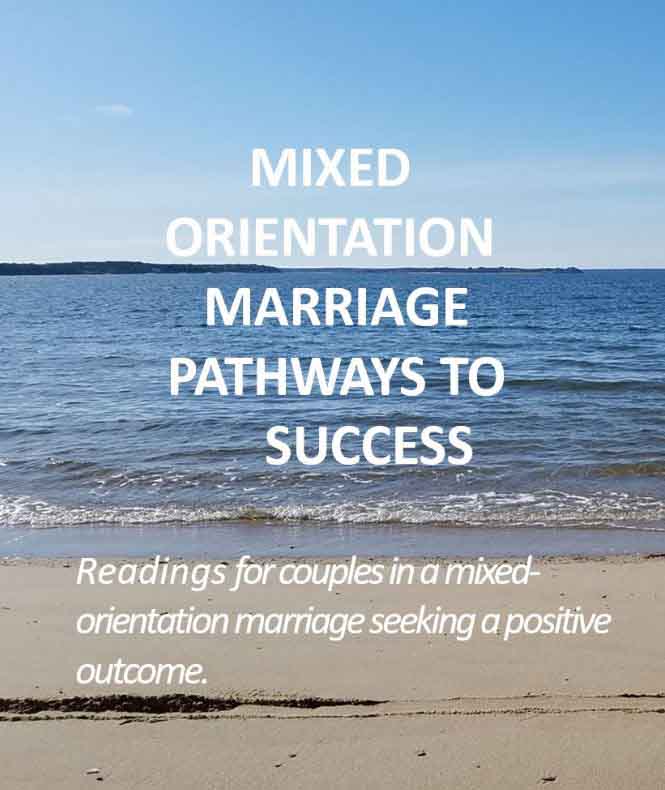Mixed-Orientation Marriage: Pathways to Success
Finding Support
Many people in mixed-orientation marriages feel isolated and alone. They feel that their friends and family won’t understand the unusual nature of their marriages. If you are like me, you want every resource available to help make our lives the best they can be. Support groups with others dealing with sexual orientation and mixed-orientation relationship issues are a valuable tool toward success. Online support groups are the easiest to get started with because, no matter what part of the world or how unusual the situation you are in, you will find others like you. Each support group has its own flavor; if one doesn’t seem to work, look for another. Also, it is important to realize there is a wide variety of needs and solutions. Treat these groups like buffets; take what you can use and leave behind what you can’t. As people become more comfortable being out about their mixed-orientation relationships they have been joining Facebook support groups. I have found these groups to be a terrific source of support.
Online support groups will also allow you to find out about real-world, in-person regional and national gatherings. A weekend of sharing, with “Me too” and “I understand,” can go a long way toward removing isolation and helping people move forward in their relationships. A weekend sharing stories and strategies for success can be life changing.
The nature of the online groups is to have an ebb and flow of activity; sometimes they can be very quiet, but the archives of older messages have a wealth of wisdom to get you started. Then dive in and start your own thread, and it will not be long before others join the conversation.
I am also a firm believer in the value of counseling with a mental health professional to help guide us. Our journeys may each have an individual story, but there are underlying themes and processes that many experience in common in their journeys. Working with a trained counselor can help us understand some of these processes and stages. It is very comforting to hear, “Oh yea, that happens, and here is why, and here is what might happen next.”
When looking for a counselor or therapist, look for someone whose expertise is in working with relationships, particularly one who has experience with sexual orientation issues and mixed-orientation relationships. Be wary of someone who seems to propose only one solution. If they say that all such marriages end in divorce, run as fast as your feet will carry you. There are a significant number of very successful mixed-orientation marriages, and you want to work with a counselor who believes in you and your relationship. The solutions need to come from within you; the counselor should serve as a guide to help you find them. If you already are working with someone you like but who has limited experience with mixed-orientation relationships, they should be willing to reach out to others who can help them better understand the issues.
Every couple has their own unique needs, level of understanding, and need for outside support. Both individual and couples therapy can be helpful. Each has a significant role, and having both should be considered as having all the proper tools to achieve the best possible outcome for all involved. So it is not unusual for those with a health plan or adequate financial resources to each have their own individual counselor as well as a couple’s counselor. Alternately, therapists in the field of marriage and family therapy have a primary focus on working with relationships and believe it to be most effective when one therapist serves as both the individual’s and the couple’s counselor. The most important aspect is to find a therapist who is a good fit for you, with whom you feel comfortable, and whom you feel you can trust. I often get asked how one finds a counselor experienced in mixed-orientation relationships. One way is by word of mouth. Ask on the support groups. If you live near a city of any size, most will have an LGBTQ+ support center, and they are an excellent source for information on support options in your area. Another good approach is to find a nearby university or college and check with their LGBTQ+ center because they will often have a local resources list.
I have listed a few support resources in Appendix A
Finally, build your own personal support network. Especially, find others who are in successful mixed-orientation relationships. I cannot over-emphasize the value of interacting with others who share your experiences—“Me too” and “I understand”— to help you find a pathway to success.
Previous Keeping the happy in happy holidays and special events. Next Positive Thinking and Success

